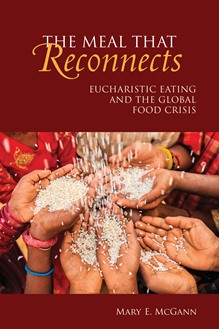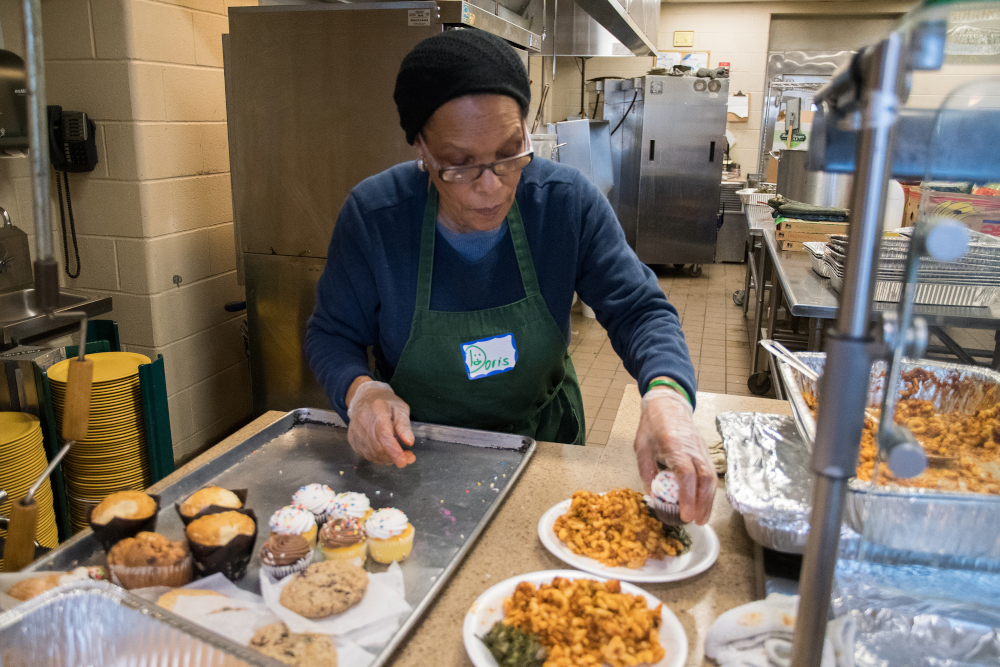
A Cistercian nun at the Valley of Our Lady Monastery near Prairie du Sac, Wisconsin, organizes Communion hosts July 13, 2006. (CNS/The Compass/Sam Lucero)

There's a certain irony in the publication of a book about the Eucharist as a "meal that reconnects" when, due to the COVID-19 crisis, many of us have no physical access to such a meal — though in some parts of the country, things are reopening.
After registering this irony, however, I read Michael Pollan's devastating New York Review of Books article, "The Sickness in Our Food Supply," describing the breakdowns in the global chains of production accompanying the pandemic. It was then that I also recognized the timeliness of a theology that so clearly connects the Eucharist to the ongoing food crisis made visible by the pandemic.
In The Meal that Reconnects, Sr. Mary E. McGann, a Religious of the Sacred Heart of Jesus sister who teaches liturgical studies at the Jesuit School of Theology at Santa Clara University in Berkeley, California, argues convincingly that one way to heal this breakdown, and the multiple injustices embedded in it, is to reclaim the foundational meal character of the eucharistic celebration, as seen clearly in the Gospels, and as enacted in the gatherings of the early Christin community. And an essential dimension of those meal fellowships was the feeding of the poor and hungry, not merely worshipping a transcendent God or re-enacting the Last Supper.
McGann divides her extraordinary interweaving of Christian eucharistic practice with current social, economic and ecological realities into three parts. In Part One, "Eating as Relationship," she shows that how we eat is a manifestation of the very kind of relationships we have with the world — either one of "consecration" or "desecration." How we eat can have an enormous impact on relationships between past and present as well as between living communities.
Advertisement
Industrial agriculture is a central instance of such desecration, dissociating eating itself from its human and biological dimensions. The pivotal role of food in Jesus' ministry, as seen particularly in Luke's and John's gospels, provides a revolutionary alternative to this industrial desacralization, this disembodiment of eating. The book's third chapter, detailing the centrality of actual banquets in the early Christian community, and the emphasis in those banquets on Jesus' multiplication and sharing of food with the poor was, for me, one of the most eye-opening parts of McGann's study.
Part Two, "Broken Relationships: Dining in the Industrial Food System," examines the corporate/industrial method of food production at the heart of the today's fractured eating relationships. In it, McGann documents how, after World War II, a coalition of businessmen, economists and public relations specialists weaponized a move away from centuries-old holistic farming practices to the control of the entire food market by a few industrialized farms. This led to the globalization of food production, the production of more and more processed food and the deregulation of trade. All of this has contributed to unhealthy fast food, endless snacking and meals in front of the television instead of around the table.
Other effects of the shift to industrial agriculture include a significant decline in global food production caused by soil destruction; damage to water resources from chemical run-offs; starvation increased by the shift of food crops for use in the production of bio-fuels; increased CO2 emissions from the transportation of non-locally-grown food; planetary temperature rise from deforestation for commercial farming; escalating food prices; and the abuse of farm-laborers around the world. McGann proposes regenerative agriculture as an alternative: local, small-scale, organically-based and committed to food justice for all rather than profit.
But how to bring about such a radical transformation? Part Three of the book focuses precisely on the Eucharist as a means of reconnection in the face of the global food crisis and underlying broken human and planetary relationships. To do so, however, Christians need to radically reconstruct their understanding of the Eucharist and of the ritual forms in which we celebrate it.
In the first place, the broken food system and the environmental crisis require us to reembrace the Eucharist as a vital meal fellowship. This includes recognizing ourselves as an assembling community, called together to act against the world's political and social evils. To do so, we need to assemble around a small common table where we engage not only in ritual but in diaconal service to all. We need also to use, as the disciples did literally, one loaf made from local grain, not today's industrially manufactured hosts, and to drink from one cup of locally made wine.
And even as we share that meal, we need to demonstrate earth's unlimited abundance by offering food to all, as the early Christian communities did, and not only the consecrated bread and wine. Ultimately, then, the meal fellowship becomes an offering of thanks for all of creation, one that will birth an "alternative economy" through celebration, education and action, one that will lead us to embrace our earthly embeddedness. It is the meal that does not only connect us, but reconnects us, to God in all.

Doris Williams, a parishioner at St. Matthew Church in Baltimore, helps prepare hot meals Jan. 2, 2018. (CNS/Catholic Review/Kevin J. Parks)
In a review of this length, it is impossible to do justice to the richness of McGann's eucharistic theology and the extraordinary range of sources she makes accessible as she constructs it. I was especially impressed by her nuanced integration of Pope Francis' encyclical, "Laudato Si', On Care for Our Common Home," into the concluding section of her study. Particularly in the last chapter, where she details possible ways of revitalizing the ecological, social and economic embeddedness of eucharistic eating, McGann's engagement of the works of Norman Wirzba, Ched Myers, William Cavanaugh, Wenonah Hauter and many others massively expanded my scholarly reading list.
No book, however, even a splendid one like The Meal that Reconnects, is without the occasional flaw. In this case, McGann's eagerness to make her argument accessible seems to result in her use of numerical listings of the various parts of those arguments. Doing so occasionally is a fine idea but doing so as frequently as McGann does risks sometimes confusing rather than clarifying the material.
In light of the overall desperately needed contribution made by The Meal that Reconnects, however, this is trivial business. I urge you: buy it, study it and share its arguments with your community.
[Marian Ronan is research professor of Catholic studies at New York Theological Seminary, in New York City, and the author or co-author of seven books.]
Editor's note: Love books? Sign up for NCR's Book Club list and we'll email you new book reviews every week.







